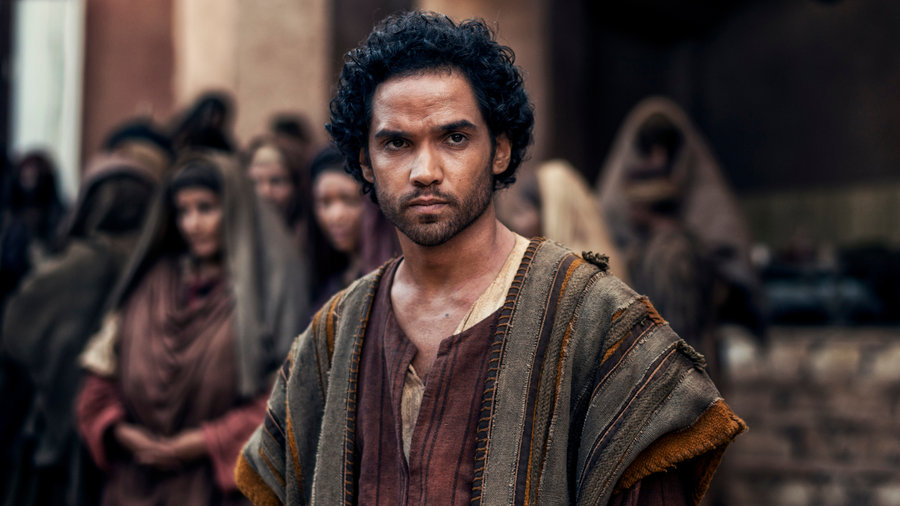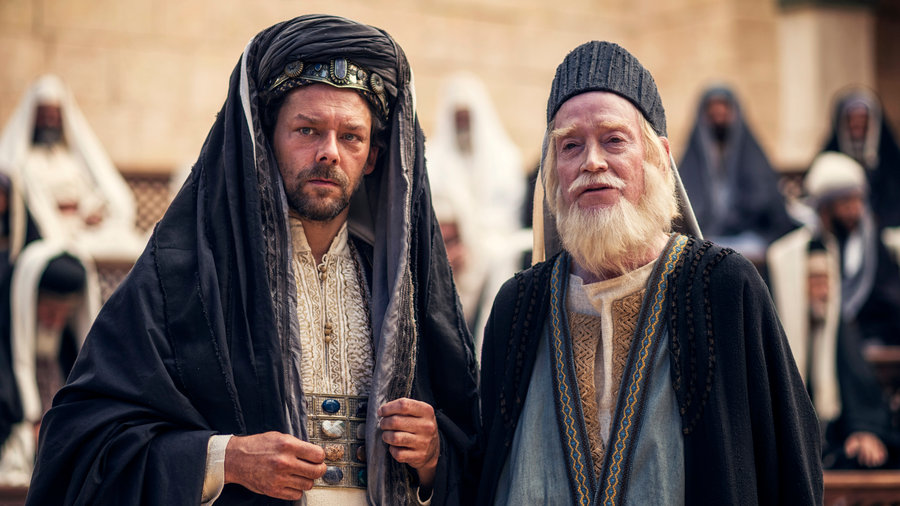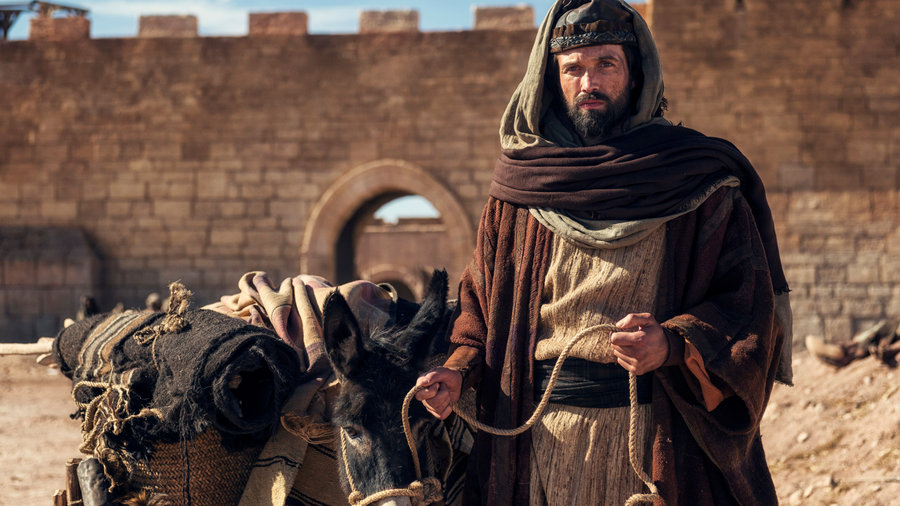Alissa’s Note: A.D. The Bible Continues began airing on Easter Sunday, and during its run, Peter Chattaway recaps episodes as they air. Recaps involve spoilers, especially if you’re not familiar with the Bible story.
Episode 5: 'The First Martyr'
This is the first episode of A.D. The Bible Continues that was a near-total letdown, for me. But to explain why, I have to talk a bit about previous adaptations of the book of Acts. In particular, I have to talk about another NBC series that had the letters "A.D." in the title.
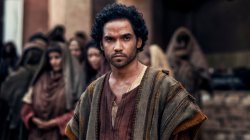 NBC
NBCBack in 1985, the five-part miniseries A.D. Anno Domini—produced and co-written by the same people who made Jesus of Nazareth—covered the entire book of Acts and mixed it with the lives of the Caesars as well as a couple of fictitious romances involving a Roman soldier and a Jewish slave on the one hand, and a Zealot and a female gladiator on the other.
The miniseries had its weaknesses, but one of its great strengths was the attention it paid to the diversity of Jewish thought at the time of the apostles, and how it explored this diversity through the relationship between the firm but tolerant rabbi Gamaliel (played by The Paper Chase's John Houseman) and his increasingly dogmatic student Saul.
Even better, the miniseries paid special attention to the incremental ethnic diversity of the early Church, starting with how the early Church—which began as a movement of Galilean Jews—appointed seven Hellenistic Jews to oversee the distribution of food to the poor, because it was the widows from their community who were being overlooked.
And somewhere in the middle of all that, the miniseries gave us an utterly dynamic portrayal of Stephen, the Hellenistic Jewish Christian who also became the Church's first martyr. With his charismatic preaching, his heartbroken indignation at being put on trial before the Sanhedrin, and his forgiveness of the men who facilitated his death—including his former friend Saul—A.D. gave us a Stephen to remember.
All very dramatic, all very complex, and mostly quite biblical. And there was almost none of that in last Sunday's episode of A.D. The Bible Continues.
Oh, sure, it introduces characters like Gamaliel and Saul—who never appear in the same scene together—and it climaxes with Stephen's death, but it handles these elements in only the most cursory way, so that it can focus the bulk of its running time on what truly matters: the capture, torture and violent death of the fictitious assassin Boaz.
The friction between Hebraic and Hellenistic Jewish Christians? Doesn't exist. Stephen's service to the poor? Not only do we never see it, but the Stephen of this episode protests that he's too smart for such stuff, and he wants to preach instead—and we never get to see him do that, either. Nor do we see any of the miracles performed by him.
The biblical Stephen was arrested because some of his fellow Jews made false allegations against him, but the Stephen of A.D. isn't arrested at all—instead, he walks straight into the Sanhedrin, all ticked off because his friends were flogged, and starts haranguing the elders. (Those gusts of wind that signified that Peter was full of the Holy Spirit last week? Stephen doesn't get any of that here.) And then he's taken outside and stoned to death.
 NBC
NBCAs for Gamaliel, he seems more glib than wise. His defense of the Christians—his famous admonition that the followers of Jesus should be left alone, lest the Jewish leaders find themselves fighting God—actually begins with a trite comment to the effect that surely Caiaphas must remember what it was like to be young and full of enthusiasm.
And it boggles the mind that this series could introduce Gamaliel and Saul in the very same episode without ever making a link between the two of them (as per Acts 22:3). Maybe future episodes will acknowledge that Saul was once Gamaliel's student, but I'm not too hopeful right now.
Oh, and just to add insult to injury, this episode also briefly introduces the character Philip, who, in the Bible, was one of the original seven Hellenistic Jewish deacons along with Stephen, but here he has no connection to Stephen whatsoever. He's just a guy who bumps into the apostles when he helps some Jews to hide from Pilate's executioners.
The episode does have some redeeming qualities.
A.D. The Bible Continues is the only adaptation of the book of Acts I can think of that has actually depicted the deaths of Ananias and Sapphira, who were killed supernaturally for lying to the Holy Spirit in last week's episode. In this week's episode, the early Church is still dealing with the fallout from that ("Great fear seized the whole church," as Acts 5:11 says). Kudos to the series for not skipping over one of the tougher stories in Acts.
This episode is also one of the few dramatizations of Acts to show an angel breaking the apostles out of prison—most films just show a beam of light—and it does this without looking chintzy. (Though note how, even here, the show deviates from the Bible just a tad in not allowing the angel to speak. The angels never speak in this series.)
And Caiaphas, for all his antagonism towards the early Church, continues to be one of the most interesting characters on the show. In fact, I'm starting to like him more than the early Christians.
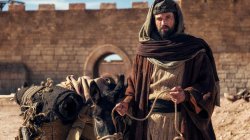 NBC
NBCThere's a moment in this episode when Caiaphas and Peter both find themselves looking at the body of Boaz—tortured by the Romans and mercy-killed by a fellow Zealot—and Peter, who knew Boaz as a boy, sings a sad passage from Psalm 69. Before long, Caiaphas joins in. For a moment, their shared Jewish heritage is what matters.
And then Peter decides to spoil the moment by using the death of Boaz as a witnessing tool, and he gets all in-your-face with Caiaphas about Jesus to the point where, of course, Caiaphas has Peter arrested all over again.
Combine this with the way cocky young Stephen disrupts the Sanhedrin, and the impression one gets is that these early Christians are a reckless and overly aggressive lot.
Incidentally, for those keeping track: The first two episodes of this series were based on the gospels, and the next three episodes zipped right through the first seven chapters of Acts and have now deposited us at the beginning of chapter 8 ("And Saul approved of their killing him"). There are seven episodes to go, and this series is only supposed to go as far as chapter 10.
I anticipate lots of narrative padding between now and the end of this season: more Jews killing Romans, more Romans killing Jews, more everybody killing Christians, and so on. But surely there was more to life in the first century than this. And surely this series doesn't have to revel in each twist of the knife or rock to the head, as this episode does.
Peter T. Chattaway writes about films in general, and Bible films in particular, at FilmChat.


